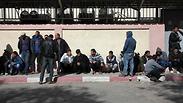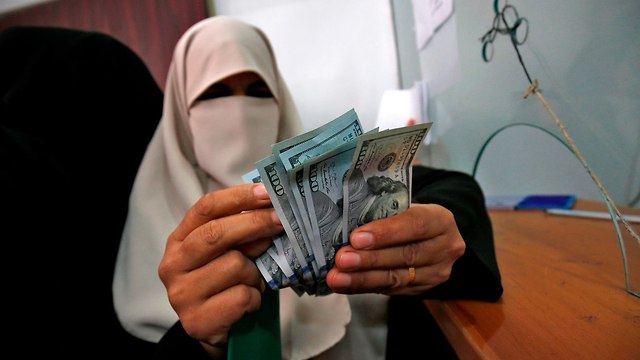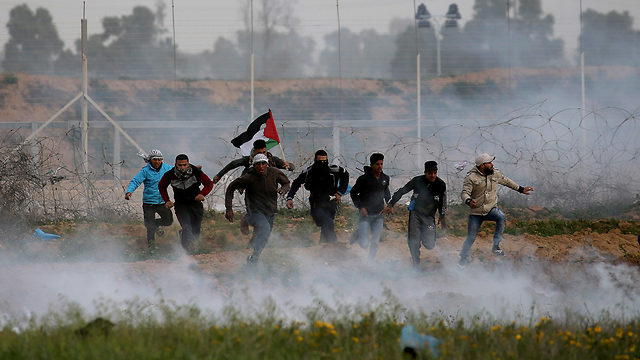
Starving the Palestinians of money will cost Israel dearly
Opinion: The government in Jerusalem should be able to see the end result of the decision to withhold tax refunds from the PA; it's not like they haven’t been through this exercise in futility before.
At the beginning of the first intifada, some 30 years ago, Fatah members in a West Bank town hanged a collaborator with Israel from a high-voltage pole. As a punitive measure, the local IDF commander decided to remove the electricity poles. The outcome: the government of Israel spent a million shekels on fixing the electricity in the area.
Three decades have passed since then, and generations of Israeli decision-makers have come and gone, but the wise men of Chelm never change. On Sunday, the Israeli government discussed how to implement a previously reached decision to cut NIS 500 million a year from Palestinian tax revenues, on the grounds that a similar sum is paid to the families of security prisoners jailed in Israel.
The government's decision seems logical at first glance. In order to punish these murderers and deter others from going down the same path, Israel cannot possibly support them or their families. But reality has its own logic, and Israel will not only eventually have to transfer the money to the Palestinians, but it will also have to pay interest on it. It is the electricity pole all over again.
The Palestinian Authority starts 2019 with a deficit of NIS 3 billion, out of an annual budget of NIS 18.5 billion. This deficit is mainly down the fact that the US has stopped pumping $1 billion directly and indirectly to the PA. Add to that the half billion shekels that will be deducted from Israel's tax rebate and the Palestinians are starting the year with a budget deficit of 30-40 percent. This means that PA currently has no real capacity to keep all of its mechanisms running.
Such a situation translates to massive dismissals of civil servants — doctors, teachers, policemen and so on. The UN's relief agency for the Palestinians, UNRWA, begins the year with a deficit of $527 million: none of its clinics will open, and it will not provide food donations in the Gaza Strip and the West Bank. In 2018, UNRWA managed to make up the shortfall from the US with international donations. This year, however, the donors are hardly queuing up.
On January 31, the Americans cut $35 million of the $61 million they were giving to the Palestinian security forces. There was no money for training, equipment, fuel or ammunition, so they sat at home. Hospitals in Gaza no longer have antibiotics, because Abbas cut the health budget to the Strip by NIS 150 million. Does anyone seriously believe this will pass quietly?
And when the PA is dealt a blow in Ramallah, the backlash comes from Gaza. While the PA has declared that it would give its very last dollar to the families of the prisoners, it has already decided to stop paying salaries to the families of 1,700 Hamas prisoners from both Gaza and the West Bank. At the same time, it cut salaries for another 5,000 civil servants in Gaza, considered to be loyal to Mohammed Dahlan, Fatah's former strongman in Gaza and Abbas ally turned foe.
Now this saga is threatening to deliver a death blow to the Gazan economy. These numbers have one outcome: unrest. People will not be working, they will take to the streets, and Israel will be the address for all expressions of discontent. This will inevitably lead to the government in Jerusalem scrambling to find a way to restore the calm, at any price. No one wants another intifada, and certainly not in an election year.
It is no wonder that Benjamin Netanyahu delayed the decision to deduct the sums going to prisoners' families from the PA tax refunds, citing bureaucracy. The decision to withhold the money was made in July last year, was supposed to be implemented in January, but was somehow discussed again Sunday in light of the April 9 elections.
Meanwhile, Israel can at least be satisfied with the fact that the financial crisis has forced Hamas to cut its propaganda branches. Dozens of employees of the Al-Quds television channel have received letters of dismissal, Hamas's Al-Aqsa TV is not paying its workers' salaries, and prominent websites have been shut down. But no one in Israel can predict what will happen in another three months, when Qatari millions are no longer being poured into the Gaza Strip.
On the one hand, the Israeli defense establishment insists that a military solution is destructive, but on the other hand, the Israeli government is exacerbating the economic crisis in the territories, which means a crisis in civilian welfare. The outcome of this is clear: Israel will be back to square one, pay compound interest on the withheld funds, and also endure public condemnation for its efforts.












